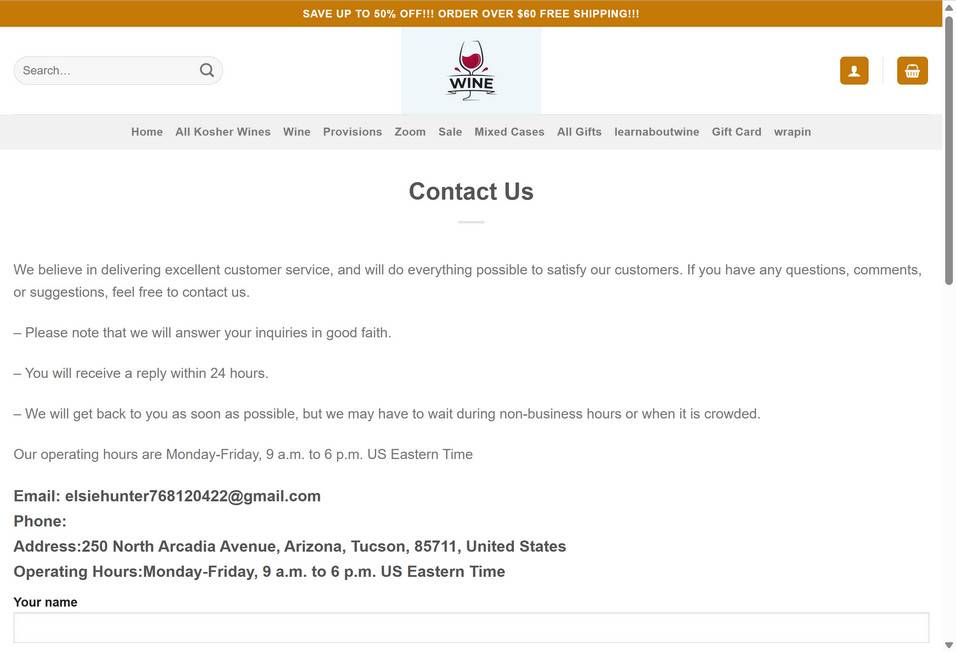If you are looking for a reliable online store to buy wines and other products, you might have come across bestlovewine.com. This website claims to offer a wide range of kosher wines, moscato, cabernet, and more at discounted prices. But is bestlovewine.com a trustworthy site or a scam? In this review, we will examine some red flags and facts about bestlovewine.com that you should know before placing an order.

Bestlovewine.com Red Flags
Here are some of the reasons why you should avoid Bestlovewine.com at all costs:
– The domain name of bestlovewine.com was registered only a few months ago, on January 18, 2023. This is a very short time for an online store to establish its reputation and credibility. Usually, scam websites use new domain names to avoid detection and negative reviews.
– The contact information of bestlovewine.com is very vague and suspicious. The website provides only an email address (elsiehunter768120422@gmail.com) and a physical address (250 North Arcadia Avenue, Arizona, Tucson, 85711, United States) that do not match the name of the company or the products they sell. Moreover, the email address is a free Gmail account that anyone can create, and the physical address belongs to a residential property that is not related to bestlovewine.com.
– The website design and content of bestlovewine.com are very poor and unprofessional. The website has many grammatical errors, spelling mistakes, and broken links. The images of the products are low-quality and copied from other sources.
– The prices of the products on bestlovewine.com are too good to be true. The website offers discounts of up to 80% on most of the products, which is unrealistic and unsustainable for any genuine business. Moreover, the website does not provide any details about the shipping costs, delivery time, or tracking information for the orders.
– The payment methods of bestlovewine.com are very limited and insecure. The website only accepts payments through PayPal, which is not a guarantee of safety or refund in case of a scam. The website does not have any SSL encryption or other security measures to protect the customers’ personal and financial information.
Is Bestlovewine.com a scam?
Based on the above red flags, we can conclude that Bestlovewine.com is a scam website that should be avoided by online shoppers. There is no evidence that Bestlovewine.com is a legitimate or reliable website that delivers quality products or services to its customers.
Customers who have shopped from Bestlovewine.com have reported that they either did not receive their orders at all or received different or inferior products than what they ordered. They also complained that they could not contact the website for a refund or exchange because the email address provided was invalid or unresponsive.
Therefore, we advise you not to shop from Bestlovewine.com or any other similar websites that display the same red flags. You will only risk losing your money and personal information to scammers who do not care about your satisfaction or safety.
What should you do if you have shopped from Bestlovewine.com?
- Contact your bank or financial institution: If you have paid with your credit card or debit card, you should contact your bank or financial institution as soon as possible and request them to cancel the transaction and refund your money. You should also report the website as a fraudulent site and ask them to block any future charges from it.
- Change your passwords: If you have created an account on Bestlovewine.com or used the same password for other online accounts, you should change your passwords immediately. You should also enable two-factor authentication for your accounts if possible. This will prevent hackers from accessing your accounts and stealing your personal information.
- Beware of phishing emails: You might receive emails from Bestlovewine.com or other sources claiming to be related to your order or offering you discounts or refunds. These emails are likely to be phishing attempts that aim to trick you into clicking on malicious links or downloading attachments that can infect your device with malware or steal your information. You should delete these emails and do not open any links or attachments from them.
- Use a browser-based content blocker, like AdGuard : Content blockers help stop malicious ads, Trojans, phishing, and other undesirable content that an antivirus product alone may not stop.
- Scan your device for malware. If you suspect your device is infected with malware, you can run a scan with Malwarebytes Anti-Malware Free.
Bestlovewine.com Final Thoughts
In conclusion, Bestlovewine.com is a scam website that you should avoid at all costs. It has many red flags that indicate that it is not trustworthy or reliable. It has a fake contact address, a short lifespan, negative customer reviews, no security measures, and stolen content. Do not waste your time or money on this website, as you will likely end up disappointed or scammed.

